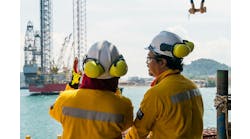"Absolutely, it is our responsibility," said BP CEO Tony Hayward in an NPR interview. "We will absolutely be paying for the cleanup operation. That's our responsibility and we accept it fully." BP and all the other oil companies are in a bad situation. An extremely low probability of failure scenario, coupled with what appear to be bad decisions by both BP and Transocean have conspired to make BP the villain of offshore oil production. There is talk of halting all exploration off the coast of the US. There is talk of punitive penalties against BP. There is virtually no understanding in the press or on the part of the general public of what has happened. We're beginning to learn what happened, and BP has completely bypassed the $75 million cap by spending over $500 million and counting as this editorial goes to press. Yet there are people who believe BP, and by inference, all oil companies are somehow "guilty" of this "environmental catastrophe."
Since 2005, when a catastrophic and preventable accident destroyed a significant part of the BP refinery in Texas City, Texas, BP's upstream and downstream units have devoted funding and real change management to making, as Hayward has put it, "safety our number one priority." Quietly and without fanfare, BP has revised training programs, safety systems, safety planning and implementation. The DuPont safety system is the standard of the industry, and it has been adopted wholesale by BP. So what went wrong?
What BP can't change is the fact that subsea drilling is dangerous. In the case of the current disaster, all of the safety systems failed, including the last best hope—the blowout preventer. The odds of this happening in a company with a good, if new, safety culture are so low as to be immeasurable. And both BP and Transocean were lulled by the fantastic safety record of the rig.
So what does this tell us? It tells us, that offshore development, like the refineries, involves a set of complex systems, and can't be defended from risk by linear engineered systems. All safety systems, whether SIS in manufacturing or fire and gas safety in offshore environments, are designed to manage acceptable risk, not remove it entirely.
Yes, the sinking of the BP drilling rig has produced a significant ecological threat. But should we use this as an excuse to stop offshore exploration and development?
Not until somebody comes up with a fuel source that doesn't require hydrocarbons. Wind and solar energy are capable of replacing a maximum of about 10% of our need for oil for fuel. Battery technology has not significantly improved in the last 20 years. Hydrogen is always just over the horizon.
Some say that we need to stop exploration as a deliberate choke hold on our need for oil. That's arrant nonsense. The only way we're going to curb our need for oil is to produce vehicles and power plants that do not use oil. Nuclear plants generating hydrocarbon-free electricity to run electric vehicles would go a long way to keep us from running out of oil. Oil ought to be used as a chemical feedstock for things like clothing, building materials and shelter—not fuel.
We want our gasoline, our nylon, our styrofoam plates and all the other things we make from oil, but we aren't willing to accept the consequences and mitigate them.
Even when a company like BP does everything it can think of to minimize risk from its activities, things can still go wrong. It is good that Mr. Hayward has committed his company to paying for the cleanup operations. But it is not so good that we, our government and the media are at his throat without accepting the responsibility that we too have for what has happened in the Gulf of Mexico.




